A nonprofit news organization covering the U.S. criminal justice system
Projects
Topics
About
Feedback?
support@themarshallproject.org
Six vivid portraits by local artist Cbabi Bayoc honor the lives of victims of unsolved homicides in St. Louis.
The Marshall Project and STLPR are bringing community organizations from across St. Louis together to offer services to families of homicide victims.
Reporters from The Marshall Project and The Appeal reveal flaws in official death reporting and identify steps families can take to get information.
Six vivid portraits by local artist Cbabi Bayoc honor the lives of victims of unsolved homicides in St. Louis.
St. Louis-based artist Cbabi Bayoc shares about his creative path and the making of six portraits of unsolved homicide victims for “Remember Me.”
Join reporters from STLPR and The Marshall Project as they discuss the state of unsolved homicides in St. Louis a year after the initial investigation.
Join The Marshall Project and The Journalist's Resource for this on-the-record conversation with experts on prison staffing declines and sweltering heat, two dangerous conditions plaguing many facilities.
How do images impact the communities we cover?
Come meet The Marshall Project staff in Cleveland and share about your work.
Join us for an on-the-record conversation with experts who will share insights from their research and reporting on deaths behind bars.
An in-person community discussion about the proposed Cuyahoga County Jail.
We want to hear from journalism educators and advisers on how our criminal justice data and resources can meet the needs of your students.
Join The Marshall Project and The Journalist’s Resource to explore a unique political survey of more than 54,000 incarcerated people.
A conversation on voting rights in Mississippi, including for people affected by the criminal justice system.
Most people are familiar with the four branches of public safety: Police, Fire, EMS and 911. But who do you call when someone is in a mental health crisis?
An opportunity for St. Louis residents to hear from St. Louis Public Radio, APM Reports, and The Marshall Project reporters about their investigation into the roughly 1,000 unsolved homicides in the city. Join us on Tuesday, June 25 at 7 p.m. CST.

Join us on January 29, 2024, at 1:30 PM CST at the Weems Auditorium of the University of Mississippi Law School to discuss how we can reshape Mississippi's criminal legal system narrative.
Round-the-clock solitary confinement. Shackles. No education.

Come talk with us about Cuyahoga County criminal court judges — and who votes for them.

Come talk with us about Cuyahoga County criminal court judges — and who votes for them.
A conversation with Nigel Poor and Reginald Dwayne Betts

This one-hour webinar will challenge you to think more critically about the language you use to describe incarcerated people in your reporting.
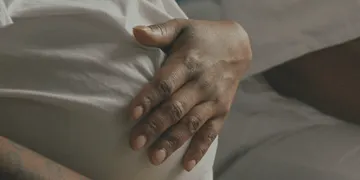
Reckon by AL.com will host an online panel discussion for Tutwiler, a documentary short by The Marshall Project and FRONTLINE (PBS).

A Facebook watch party for Tutwiler, a documentary by The Marshall Project and FRONTLINE (PBS).

A screening and discussion of Tutwiler, a documentary short by The Marshall Project and FRONTLINE PBS on what it is like to be an expectant mother in Alabama’s Julia Tutwiler Prison, and the doula program trying to help these women prepare for birth.

A screening and discussion of Tutwiler, a documentary short by The Marshall Project and FRONTLINE PBS on what it is like to be an expectant mother in Alabama’s Julia Tutwiler Prison, and the doula program trying to help these women prepare for birth.

A screening and discussion of Tutwiler, a documentary short by The Marshall Project and FRONTLINE PBS on what it is like to be an expectant mother in Alabama’s Julia Tutwiler Prison, and the doula program trying to help these women prepare for birth.
A free panel discussion exploring the history of United States’ immigrant detention policy.
A screening and discussion of our immersive short film series exploring the nature of crime, punishment and forgiveness through portraits of Chicagoans who have been touched by the criminal justice system.
A screening and discussion of our immersive short film series exploring the nature of crime, punishment and forgiveness through portraits of Chicagoans who have been touched by the criminal justice system.
A screening and discussion of our immersive short film series exploring the nature of crime, punishment and forgiveness through portraits of Chicagoans who have been touched by the criminal justice system.
A screening and discussion of our immersive short film series exploring the nature of crime, punishment and forgiveness through portraits of Chicagoans who have been touched by the criminal justice system.
A screening and discussion of our immersive short film series exploring the nature of crime, punishment and forgiveness through portraits of Chicagoans who have been touched by the criminal justice system.
A screening and discussion of our immersive short film series exploring the nature of crime, punishment and forgiveness through portraits of Chicagoans who have been touched by the criminal justice system.
A screening and discussion of our immersive short film series exploring the nature of crime, punishment and forgiveness through portraits of Chicagoans who have been touched by the criminal justice system.
A screening and discussion of our immersive short film series exploring the nature of crime, punishment and forgiveness through portraits of Chicagoans who have been touched by the criminal justice system.
A screening and discussion of our immersive short film series exploring the nature of crime, punishment and forgiveness through portraits of Chicagoans who have been touched by the criminal justice system.
A 2020 Democratic Presidential candidate town hall on criminal justice reform – set inside a museum that was once a prison – with questions from impacted people and their families.
A screening and discussion of our immersive short film series exploring the nature of crime, punishment and forgiveness through portraits of Chicagoans who have been touched by the criminal justice system.
A screening and discussion of our immersive short film series exploring the nature of crime, punishment and forgiveness through portraits of Chicagoans who have been touched by the criminal justice system.
A screening and discussion of our immersive short film series exploring the nature of crime, punishment and forgiveness through portraits of Chicagoans who have been touched by the criminal justice system.
A screening and discussion of our immersive short film series exploring the nature of crime, punishment and forgiveness through portraits of Chicagoans who have been touched by the criminal justice system.
A screening and discussion of our immersive short film series exploring the nature of crime, punishment and forgiveness through portraits of Chicagoans who have been touched by the criminal justice system.
A screening and discussion of our immersive short film series exploring the nature of crime, punishment and forgiveness through portraits of Chicagoans who have been touched by the criminal justice system.

A screening and discussion of our immersive short film series exploring the nature of crime, punishment and forgiveness through portraits of Chicagoans who have been touched by the criminal justice system.
A screening and discussion of our immersive short film series exploring the nature of crime, punishment and forgiveness through portraits of Chicagoans who have been touched by the criminal justice system.
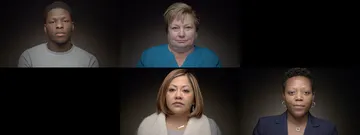
A screening and discussion of our immersive short film series exploring the nature of crime, punishment and forgiveness through portraits of Chicagoans who have been touched by the criminal justice system.
A screening and discussion of our immersive short film series exploring the nature of crime, punishment and forgiveness through portraits of Chicagoans who have been touched by the criminal justice system.
A screening and discussion of our immersive short film series exploring the nature of crime, punishment and forgiveness through portraits of Chicagoans who have been touched by the criminal justice system.
A screening and discussion of our immersive short film series exploring the nature of crime, punishment and forgiveness through portraits of Chicagoans who have been touched by the criminal justice system.
A screening and discussion of our immersive short film series exploring the nature of crime, punishment and forgiveness through portraits of Chicagoans who have been touched by the criminal justice system.
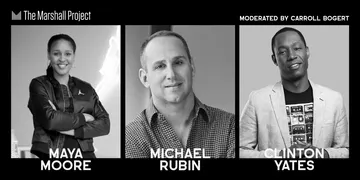
A monthly speaker series from The Marshall Project

An immersive short film series exploring the nature of crime, punishment and forgiveness through portraits of Chicagoans who have been touched by the criminal justice system.
A monthly speaker series from The Marshall Project
A monthly speaker series from The Marshall Project
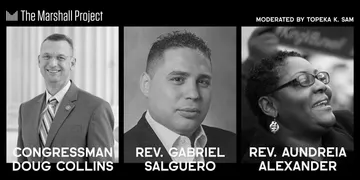
A monthly speaker series from The Marshall Project
A powerful short film series explores what it means to be an immigrant in America today.
A monthly speaker series from The Marshall Project
A monthly speaker series from The Marshall Project
A monthly speaker series from The Marshall Project
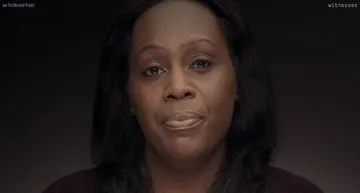
An evening of film and discussion on women and incarceration
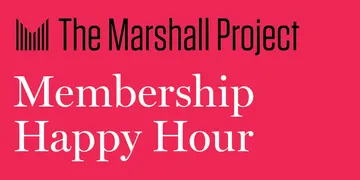
Gather with fellow members and fans of The Marshall Project
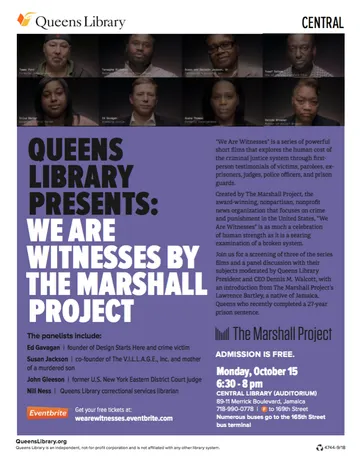
Screening + Discussion

Telling true stories in turbulent times

Stories from the American Criminal Legal System
A new monthly series from The Marshall Project
A conversation on restoring human rights post-incarceration
How the school-to-prison pipeline is transforming American kids
Topic Talks

The History and Politics of Criminal Justice in New York
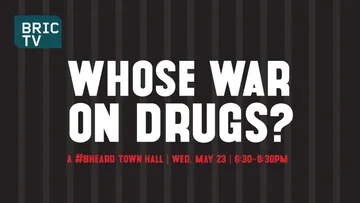
A #BHeard Town Hall
Screening + Discussion

Screening + Discussion
We Are Witnesses + Joseph Rodriguez

A #BHeard Town Hall
Public screening + discussion

The Private Prison Question